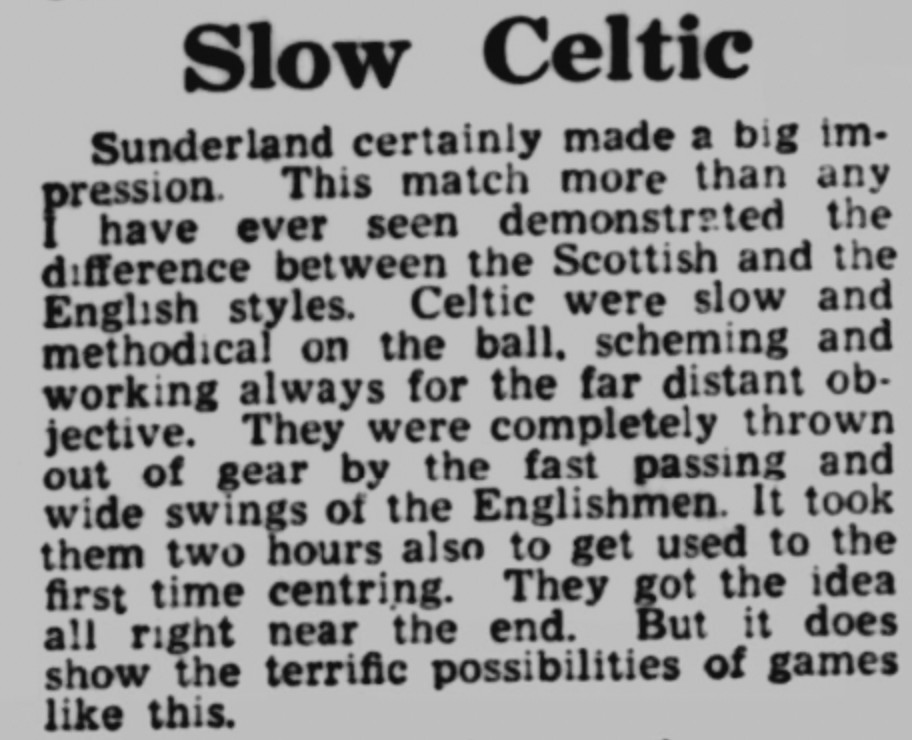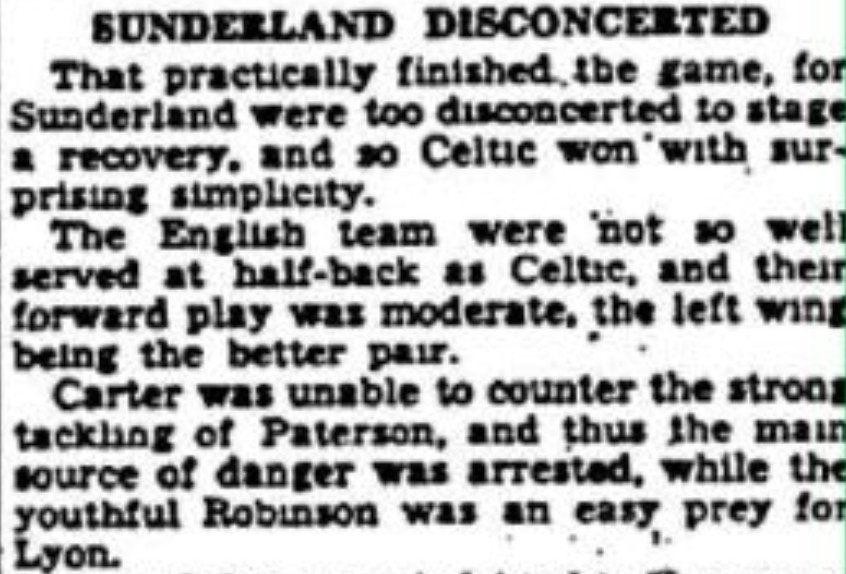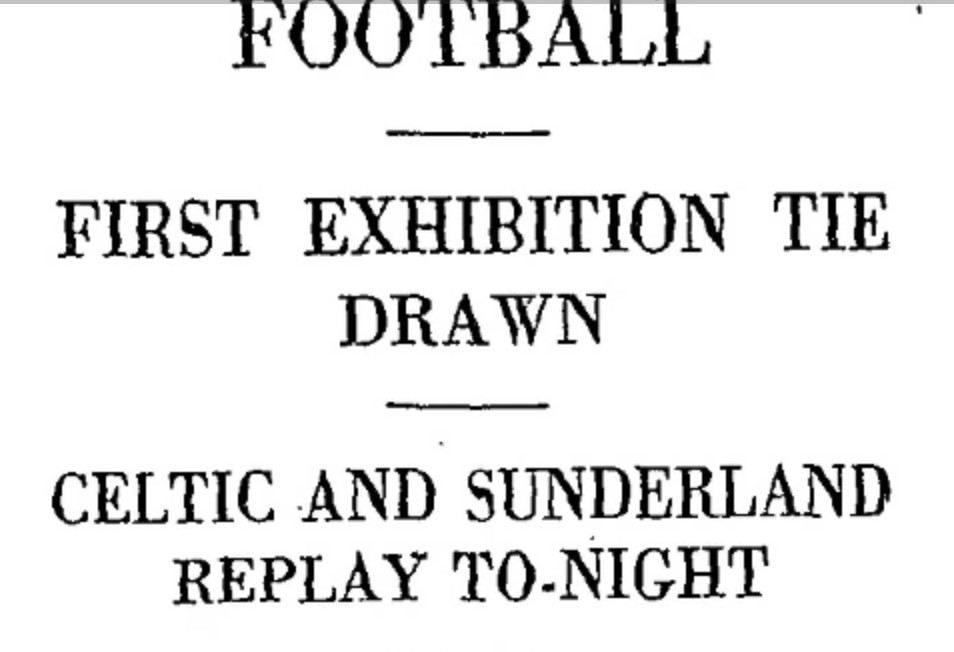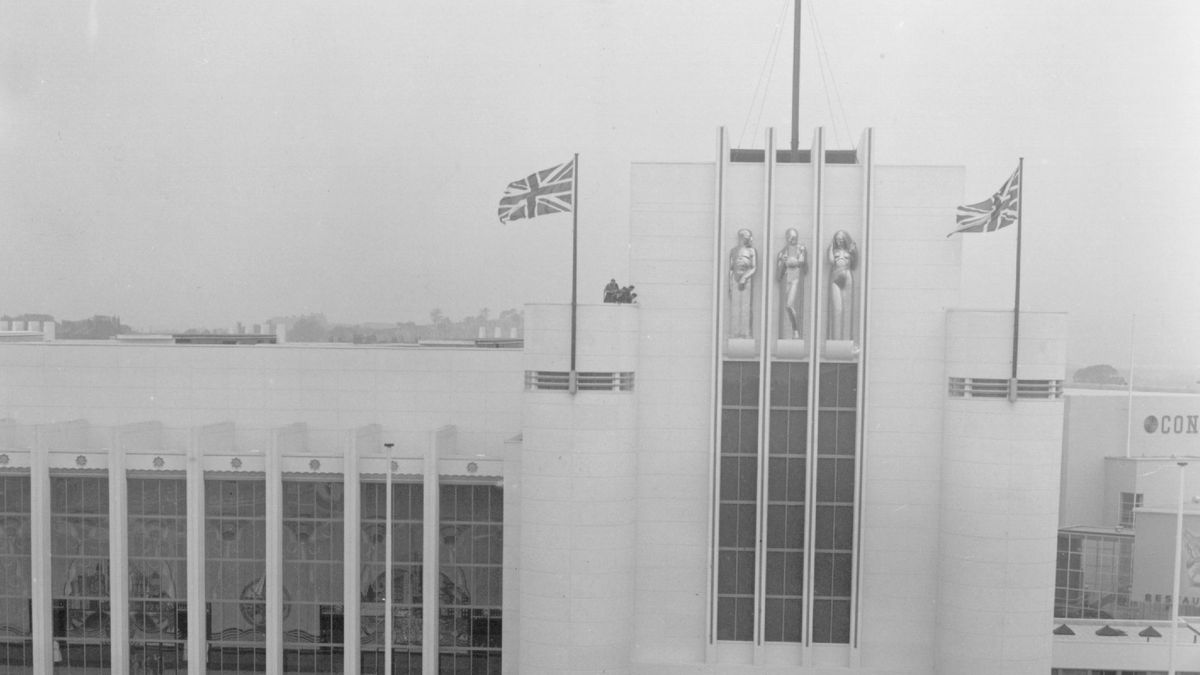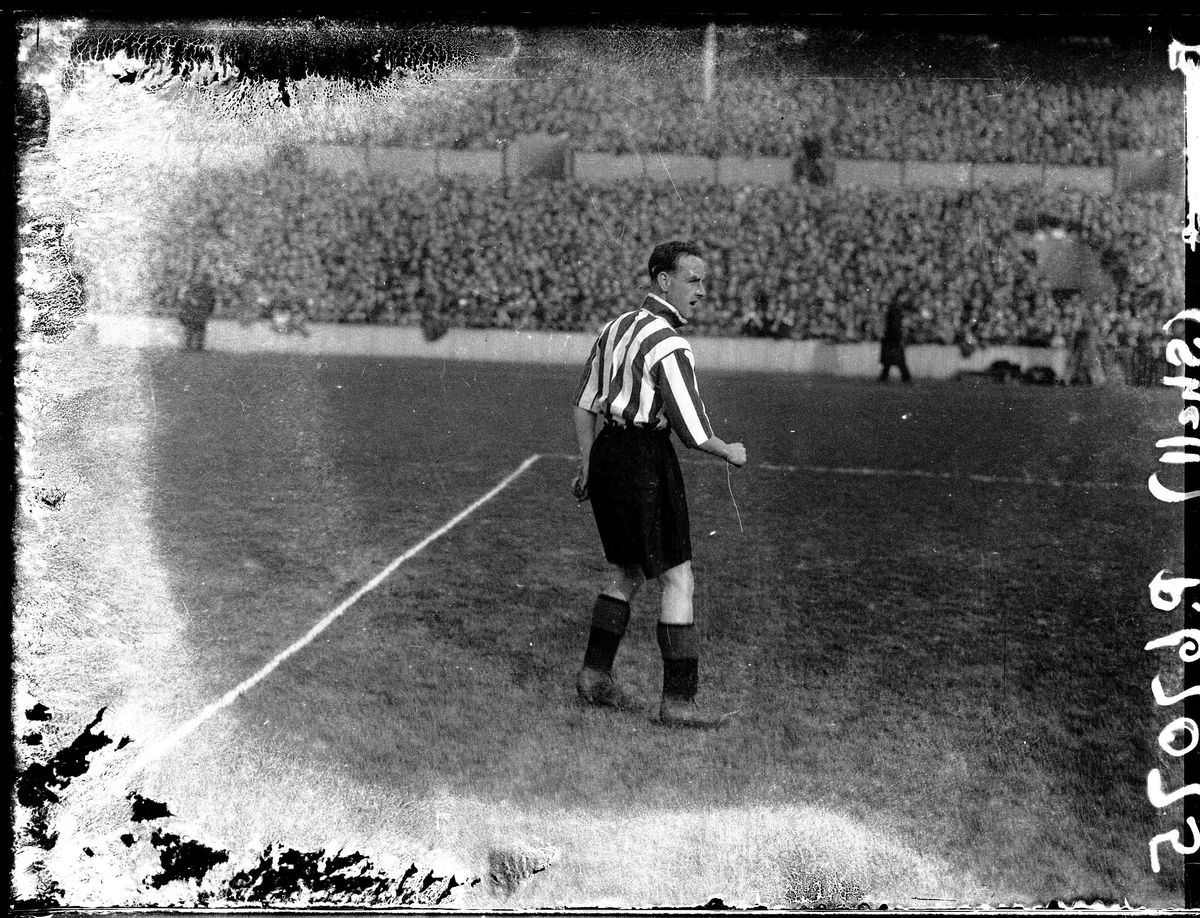| Match Pictures | Matches: 1937 – 1938 | 1938 Pictures |
Trivia
- Tournament Background and Matches: Empire Exhibition Cup
- This match was the Quarter-Final of the Empire Exhibition trophy played at Ibrox on Wednesday 25 May in front of 53,791 spectators. After 120 minutes football the game was drawn 0 – 0.
- The journalist who wrote under the nom de plume of Alan Breck didn’t fancy the prices for the stand, nor did he fancy Celtic’s chances in the replay. This may have been due to his friendship with the Sunderland manager which he mentions in his report.
- Sunderland players jostled the Scottish referee, Mungo Hutton, when decisions did not go their way
- Celtic made two changes to the team that played the following day. Lynch and MacDonald replacing Carruth and Delaney.
Review
Teams
CELTIC:
Kennaway, Hogg, Morrison, Geatons, Lyon, Paterson, Delaney, Carruth, Crum, Divers, Murphy
SUNDERLAND:
Mapson, Gorman, Hall, Horsam, Lockie, Hastings, Spuhler, Carter, Gurney, Gallagher, Burbanks.
Referee: M. C. Hutton (Glasgow).
Attendance: 55,000
Articles
- Match Report (see end of page below)
Pictures
Articles
THE EVENING TIMES, THURSDAY; MAY, 26, 1938
ALL IN THE GAME
By ALAN BRECK
CELTIC AND SUNDERLAND MEET AGAIN TO-NIGHT
The Game must be Played to a Finish.
EXHIBITION TOURNEY’S GREAT START
“CELTIC never give cup opponents a second chance” is an old saying in Scottish football. I wonder if it will hold good to-night, when they replay their first-round Empire Exhibition Cup-tie with Sunderland.
The teams played for two hours last night without scoring a goal. The longer the game lasted the stronger Sunderland became. At the end John Cochrane’s boys were fresh and frisky compared with Celtic. I fancy Sunderland have the defensive and half-back power which Celtic lack, and moreover it is doubtful if Carruth and Delaney will be able to take part in the replay.
To-night’s game starts at seven o’clock, and must be played to a finish. That means, as I explained on Tuesday, that they will play another half hour if necessary, and if still level will play another fifteen minutes. What will happen after all that if the teams are still level will be decided by the Control Committee.
England have insisted the game should be decided according to rule— the team scoring most goals wins.
I do not think the game will drag out so far to-night, but if it does and the standard is as good as last night we will not worry.
A Big Crowd
FIFTY FIVE thousand people at the Stadium were astounded at the fury of it all. Verily the clubs are desperately keen to win the silver Tower of Empire Trophy. The attendance was surprising. It beat my estimate of 40,000, and proves that the interest in the tournament is more acute than any of us expected.
There is one thing I would like to say. I think the organisers should have made a uniform charge of, say, half a crown for the stand. Five shillings and three-and-sixpence are too high. I am sure they would pack out the stand at two-and-sixpence.
Mungo Hutton, the referee, had a difficult game to handle. The Sunderland players disagreed with some of his decisions, and I am sure under ordinary auspices one or other of them would have been booked. One incident in the second half when the referee awarded a free kick to Celtic and when he was pulled about called for punishment.
I thought Mr Hutton was unhappy in his offside decisions and those awards rattled players and crowd. Then English players were shown that Scots referees take a different view of pushing, shoving and charging than pertains to England. Outstanding fact was the temper of the players did not make the referee’s job easy. His patience must have been tried severely.
Wonderful Stamina
NOT until the second half and extra time did the Sunderland forwards show up well. Then their stamina after all that had gone before was wonderful. Celtic were put through the mill, and only the brilliant work of Kennaway saved them. One save from Carter was a masterpiece.
In the first half it was Celtic’s game. Then they had chances to score. Almost with the last kick of the second half Crum shot past when he had only Mapson to beat.
Early on Delaney was injured, and the Celtic attack got such a buffeting that when extra time started the line read— Carruth, Murphy, Crum, Divers, and Delaney. Undoubtedly it was a new experience for those Celtic forwards to encounter a defence of the Sunderland calibre. The tackling and the charging were full-blooded, and gradually Celtic were thrown out of their stride.
It was power football against a finer brand, and in the end power football was on top. The crowd got an excellent example of how the game is played in England—the tackling and the charging, the wide sweeping passes, and, as was shown by Burbanks at outside left in the second half and by Carter at intervals, some individual touches of a high order by way of a change.
Raging Tie
THOSE who expected exhibition football for the Exhibition Cup must have been amazed. It was a raging cup-tie, teeming with life and incident. The pace was terrific, and, as I say, Sunderland lasted that better.
Indeed Celtic looked exhausted at the end. Geatons, who had played so brilliantly, was tired out, and you could also see signs of distress elsewhere.
Definitely Sunderland must have trained very carefully for the tournament. No one is keener to win the trophy than John Cochrane. It would be a grand thing for his board-room, in which hangs the photograph I took of him and the late Herbert Chapman.
If Celtic are to win to-night they will require more weight in front, and I doubt if they will be able to field more penetrative men. I should imagine McDonald will be included. I am not certain who will play outside right.
A Good Argument
THE weather last night was ideal for football. A holding ground and cool atmosphere made things fine for the players. Certainly the ball had a skid, but it was not too difficult. The crowd got a bit of a soaking which makes me renew my plea for cheaper stand prices.
Our Empire Exhibition tournament has got a grand send off. Last night’s event abolished completely the idea the play would be namby-pampy.
Those who would have football in May with a break in November and December were feeling well pleased with themselves. The 55,000 crowd provided a splendid argument for them.
To-Morrow’s Game
ABOUT to-morrow night’s game between Aberdeen and Chelsea. The London side has arrived at Turnberry, and announce they will be at full power. Scots Jackson, Craig, Gibson, and Buchanan will be included. The Chelsea team:—Jackson; Barkas and Smith; Allum, Craig, and Weaver; Spence and Burgess; Payne; Gibson and Buchanan.
Aberdeen will play Adey, their new left back from Carlisle, while Hamilton, of Queen of the South, and Hume, of Hearts, are included in the forwards. The Aberdeen team:—Johnstone; Cooper and Adey; Dunlop, Nicholson, and Thomson; forwards from Smith, Hamilton, Armstrong, Brady, Hume, and Strauss.
McAloon, the old St Francis forward, is included in the Brentford team to play Hearts on Wednesday. McAloon won his place in the first team towards the end of the season. Other Brentford Scots are Crozier, Sneddon, McCulloch, and Reid. The probable team reads:— Crozier; Bateman and Poyser; Brown, James, and Sneddon; Hopkins and McAloon ; McCulloch ; Eastman and Reid.
On This Day (26 May 1938): Sunderland fall to Celtic as the Scots progress in Empire Cup replay
Sunderland took part in a “celebration of Empire” by playing Celtic twice in two days. In the end, it took 210 minutes to separate the two giants!
By DaveyBrowne37 May 26, 2022, 6:00am BST
A large crowd gathered outside the United Kingdom pavilion to see King George VI (1895 – 1952) and Queen Elizabeth at the official opening of the Empire Exhibition. The exhibition, held at Bellahouston Park near Glasgow, offered a range of exhibits including demonstrations of traditional crafts and a fun fair with a Giant Racer rollercoaster | Photo by Topical Press Agency/Getty Images
Source: https://rokerreport.sbnation.com/2022/5/26/23141013/on-this-day-26-may-1938-sunderland-fall-to-celtic-as-the-scots-progress-in-empire-cup-replay
It took 210 minutes of football over the course of two days, but Sunderland’s valiant attempt to overcome the Scottish league champions Celtic came to an end at Ibrox on this day 84 years ago.
The Empire Cup was an end of season invitational tournament held to coincide with the 1938 Empire Exhibition in Glasgow, a celebration of the Scottish metropolis’ contribution to the British imperial economy and boost the increasingly discredited idea of empire in general at a time when national liberation movements were stirring across the United Kingdom’s global “Commonwealth”.
The opening match of the Empire Exhibition Trophy competition was between the two premier clubs involved, Sunderland and Celtic, and took place on 25th May. Whilst Rangers, Hearts, and Aberdeen – the first and second-placed clubs in Scottish Division 1 in 1936-37 – completed the Scottish contingent, the English participants comprised our fellow English Division mid-table also-rans Brentford, Everton, and Chelsea alongside the 1937 FA Cup winning Wearsiders.
Soccer – Football League Division One – Sunderland
Eddie Burbanks, Sunderland Photo by Barratts/PA Images via Getty Images
Sunderland’s team comprised some of the great names of the 1930s – Raich Carter, Bobby Gurney, Jonny Mapson, Patsy Gallacher, and Eddie Burbanks. Trips had been laid on by local travel agents, ensuring that the visitors from the north east had some away support for the match.
The quarter-final was played in front of around 53,000 at the home of Celtic’s “Old Firm” rivals Rangers ended 0-0 after 30 minutes of extra time, but during this time Sunderland had managed to win over the Scottish crowd through their progressive and attractive football. Alan Breck, writing in The Evening Times the following day, summarised the action as follows:
The teams played for two hours last night without scoring a goal. The longer the game lasted the stronger Sunderland became. At the end John Cochrane’s boys were fresh and frisky compared with Celtic. I fancy Sunderland have the defensive and half-back power which Celtic lack, and moreover it is doubtful if Carruth and Delaney will be able to take part in the replay…
…Those who expected exhibition football for the Exhibition Cup must have been amazed. It was a raging cup-tie, teeming with life and incident. The pace was terrific, and, as I say, Sunderland lasted that better.
Indeed Celtic looked exhausted at the end. Geatons, who had played so brilliantly, was tired out, and you could also see signs of distress elsewhere.
Definitely Sunderland must have trained very carefully for the tournament. No one is keener to win the trophy than John Cochrane. It would be a grand thing for his board-room, in which hangs the photograph I took of him and the late Herbert Chapman.
Sunderland also managed to rough up the referee Mr. Mungo Hutton, jostling the local official when decisions didn’t go their way. John Macadam in the ‘Mack’s Crack’ column in the London Weekly Dispatch sheet recounted a remark from a Scottish supporter who was leaving the match early to the man on the Ibrox gate, “Hey, send for the polis! Celtic are getting murdered in there!”
It was, according to Macadam, the perfect example of why a British Football League would be a great success – two of the world’s great teams had provided one of the most entertaining and enthralling encounters of the season in what was nominally a friendly match.
Related
The Celtic Wiki: 1938-05-25: Celtic 0-0 Sunderland, Empire Exhibition Cup QF
London Weekly Dispatch, 29/5/1938
A replay was ordered for the following day – a turnaround we simply couldn’t imagine in modern football. Sunderland followed Celtic in making Bobby Gurney and Patsy Gallagher sat out the second game, which only attracted a crowd of 20,000 due largely to the Glasgow rain. The game was to be played to a finish – 30 minutes extra time would be followed by an addition 15, and – as the penalty shootout had not yet been invented – if they still couldn’t be separated the game would be decided by a committee!
Goalkeeper Joe Kennaway was the hero or Celtic, tipping over a drive from Carter, saving from point blank range from Burbanks, and making other vital interventions to keep the Lads at bay. Almost half an hour passed before the deadlock was broken, Sunderland’s backup forward Percy Saunders cut inside from the right wing, dribbled past the Celtic defence, and finding the net.
The lead only lasted ten minutes, however. A mistake from Mapson saw the ball slip between his hands and into the Sunderland net, and after the break, a combination of John Crum and John Divers scored two more from dibbled breakaways, with our keeper well beaten on both occasions.
Exhausted, and struggling to cope with the conditions, Sunderland couldn’t recover and were eliminated from the tournament at the first stage. It was their final game of a disappointing season, although they had reached the FA Cup semi final, the team that had dominated the middle of the decade seemed to be running out of steam with Arsenal, Everton, and Wolves taking over the mantel of the top sides in the division.
This was only a few months before the outbreak of global war once more. Our goalscorer Saunders served as a sergeant in the British Army during the war and would be tragically killed by a Japanese torpedo three years later when attempting to escape the invasion of Singapore and Malaya aboard the Dutch steamer SS Rooseboom. Things would never quite be the same again for Sunderland AFC, and the club’s golden age was behind us.
Celtic would go on to beat Hearts in the semis and Everton in the final to lift the trophy. Over 12.8 million would attend the Exhibition overall, which made a loss of £130,000 but left some fine art-deco architecture in and around the city.
The imperial realm itself would, thankfully for the hundreds of millions who suffered the degradation of foreign domination over centuries, begin to disintegrate shortly after the end of the second world war, defeated by the forces of nationalism, socialism, and post-war economics.
Its legacy remains with us to this day, unresolved to a large extent, whitewashed by an education system obsessed with Tudors and Nazis, and celebrated by those who know little of the actual history or intergenerational consequences of European colonialism.
But the “joint enterprise” of England and Scotland in developing and popularising football and other organised sports across the world is perhaps the single most incontrovertibly positive mark that the British empire left on the modern world.
It is a relationship that created our club, made it great, and continues to shape its present and future. It bridges sectarian, national, and linguistic divisions to provide a common reference point for all people, and for that, it’s worth celebrating each and every day.


